WINNIPEG — The City of Winnipeg has ordered protesters who have been blocking access to a landfill in support of a search for the remains of two Indigenous women to leave the area.
In an email, the city says it issued an Order to Vacate in accordance with the Emergency Management Bylaw late Friday afternoon to the protesters, demanding they restore full access to the Brady Road landfill by Monday at noon.
The email says the full operation of the landfill and depot is essential "for the collection of waste in order to prevent the contamination of the environment and nearby groundwater."
It also says the blockade is a violation of both city bylaws and provisions under provincial legislation, and places the city at risk of violating environmental licence requirements.
The blockade began Thursday following the Manitoba government’s decision against searching a separate landfill north of the city called Prairie Green landfill, where the remains of Morgan Harris and Marcedes Myran are believed to have been dumped.
Jeremy Skibicki faces first-degree murder charges in their deaths as well as for the death of Rebecca Contois, whose partial remains were found last year at the city-owned Brady Road landfill.
"Participants of the blockade have confirmed they have no intention to allow access into the facility any time soon," the email from the city states, noting a road to the Brady landfill is completely blocked.
"In the past, we have cooperated with the individuals who were conducting peaceful protests in a manner that did not pose a risk to the environment or the public. We have determined that these actions constitute an emergency to the health and safety of the citizens of Winnipeg and users of the facility."
The City of Winnipeg had posted a notice on its website earlier this week saying the Brady landfill was closed until further notice but did not say why.
Last fall, Ottawa funded a feasibility study into a possible search of the privately owned Prairie Green landfill. That study was carried out by the Assembly of Manitoba Chiefs following widespread backlash to police's decision not to search the dump.
The findings of that study released last month said a search was feasible, but that it would not guarantee the women's remains would be found. It said searchers would have to work through piles of hazardous materials and the overall effort could take up to three years, costing about $184 million.
It also said not searching for the women would cause "considerable distress" to their families, and send the wrong message to the wider Indigenous community, which the report said "do not deserve to be told we are trash.''
Manitoba's Premier Heather Stefanson said the province would not support a search there for the women because of health and safety risks.
On Thursday, the Assembly of Manitoba Chiefs condemned the decision not to search the landfill.
"The AMC firmly believes that the government’s inaction and denial to commit funds send a distressing message across the province and the country that First Nations’ lives do not matter to the provincial government."
"The refusal to provide funding for the search perpetuates the pain and anguish experienced by the victims’ families. It undermines the efforts toward reconciliation and meaningful partnerships between the government and First Nations."
It adds that safety concerns were addressed in the feasibility study and were not raised by provincial officials when the study was being drafted.
The former head of the RCMP, Brenda Lucki, said last year that police were not equipped to handle the complexities of searching the landfill.
Lucki, who resigned her post as commissioner in March, said in documents obtained by The Canadian Press through a request under the Access to Information Act, that the landfill site contained asbestos and other toxic gases, including ammonia.
First Nations leaders and community members have called for the Brady Road landfill to be shut down permanently.
An unidentified woman Indigenous leaders have named Mashkode Bizhiki'ikwe, or Buffalo Woman, is also believed to be another one of Skibicki's victims. Police have said they do not know where her remains may be.
This report by The Canadian Press was first published July 8, 2023.
The Canadian Press


